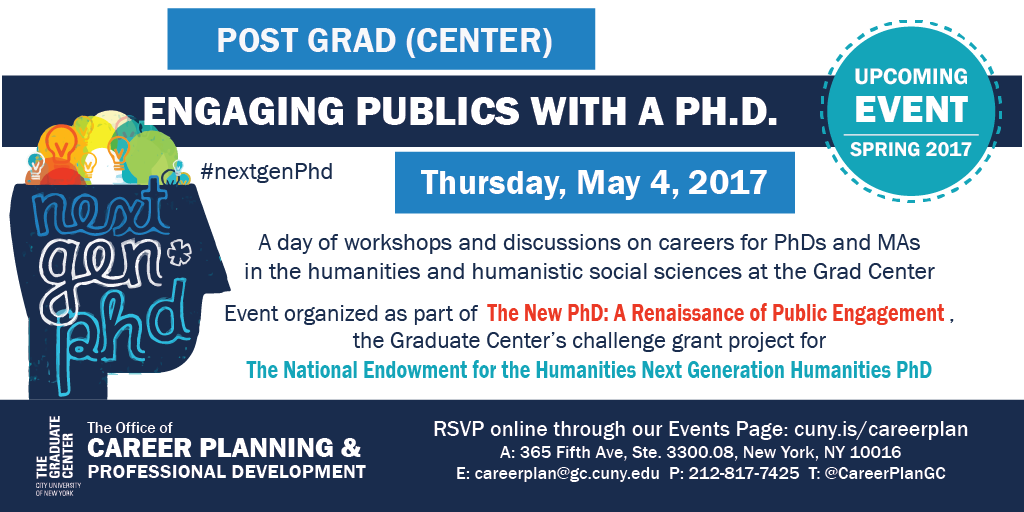Overview
Our June meeting of the Core Working Group and Project Steering Committee began with an earnest discussion of our May 4 event, Post Grad (Center): Engaging Publics with a Ph.D. Our conversations then progressed to current project implementation and ideas for next steps as our planning grant nears its end.
Review of May 4 Event
Several committee members were excited to hear others’ perspectives about our town hall event. Most committee members were not in attendance at the E.O. lunch, so many were particularly eager to hear the faculty response to our proposed curricular changes
For a detailed review of our event, see our May 4 Event Report.
Discussion about Current Project Implementation
The primary action item for the EOs is to begin devising professional development modules within their own programs that are geared toward career choices. Thus, committee members began our discussion about current project implementation by addressing how to best support the creation of these new modules.
One member suggested that the umbrella label of “professionalization” be tackled first because the term is loaded and may create a barrier to multiple career pathways. She proposed the adoption of new language such as “further intellectual engagement,” which might help students (and faculty) think about professional development as an intellectual endeavor and not just a vocational one. How do we provide a support or structure for programs to help break out of this mold, especially as faculty are not equipped for discussions regarding non-academic career paths?
Interventions within individual programs can scale depending on the desires of the faculty and students. A small intervention might be organizing an alumni panel that features graduates in non-academic careers, while radical interventions might be interdisciplinary, team-taught courses that focus on public issues. The trick is to find an open door for intervention, whether it be an assignment, single class session, or entire course. Although courses aimed at non-academic career paths are a radical intervention, for-credit classes do allow for devoted time and therefore provide less additional strain on students.
There is still considerable desire from multiple committee members to direct efforts towards faculty buy-in. Students are forming their identities during graduate school, and those identities are based on faculty, so we can’t create a culture change without them.
One idea for moving forward is to focus solely on a few programs with interested, invested parties in order to create a “coalition of the willing.” It was also suggested that the institution embrace some form of collaborative faculty training. It’s likely easier for faculty to engage with other faculty than for most faculty to engage with their students. Another committee member proposed that the institution’s centers find new ways to take advantage of college assistant experiences and make them richer.
For both faculty and students alike, the non-academic track needs to be un-ghettoized. The non-tenure track path needs to be rebranded as a different—not lesser—option. Similarly, there is still a disconnect for students that remains unaddressed. Work with first-year students this past year has shown that students are still largely gearing themselves towards an academic career even when exposed to alternatives.
Ideas for Next Steps
A few ideas emerged from our meeting discussion as possible next steps.
(1) Create a roadmap of a possible student experience
Each doctoral program has already created a sample-path-to-degree document outlining the various tasks that a student should complete during each year of study in order to stay on track for graduation and (presumably) the pursuit of an academic position post-graduation. We could create a roadmap of suggested professional development steps focused on years two through five. The roadmap would help students think about and prepare for diverse job opportunities before they begin their job search. It might also get students to think early about the dissertation they want to write to help move towards particular jobs.
(2) Focused workshops in writing for public audiences and public narrative training
A key transferrable skill that has repeatedly come up in project meetings is the ability to think about and write for multiple audiences. Workshops in writing for public audiences and public narrative training, e.g., op-eds, podcasts, program notes, and preparation to talk on television, would fit well with the public mindset and civic engagement of the Graduate Center population. One option for such workshops would be to allow for students to become experts in a field and then to teach others. Otherwise, the Office of Communications and Marketing might be able to do some of this training in order to provide some institutional cohesiveness.
(3) Public humanities event
While we want to encourage class assignments that are geared towards public audiences, we also want to provide a space for actual public engagement. A public humanities event could be organized to bring together students from four (or so) courses that have a public-facing assignment in order to allow students an opportunity to talk about their work with a scholarly and public audience. We could include outside individuals to have conversations around the presented ideas in order to help foster these communities. We would also want to knit the event into a larger narrative so that faculty know it’s not a one-time thing; these activities are encouraged and will continue.
Moving Forward
This was the final meeting for members of the Project Steering Committee. We deeply appreciate all the work they’ve done throughout the year for our project.
The Project Director and members of the Core Working Group will continue to work on the white paper in the upcoming weeks, which is to be finalized by the next (and last) meeting of the Core Working Group.



